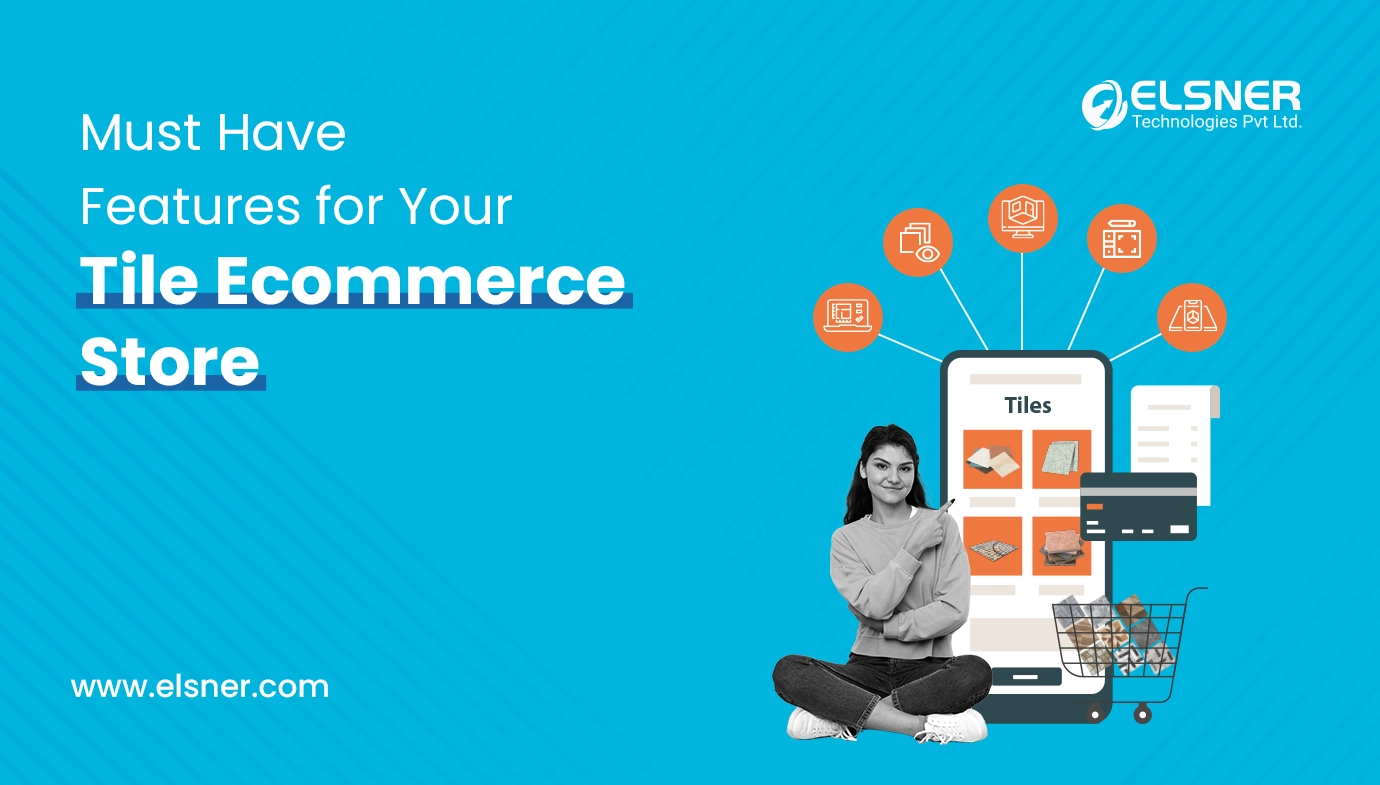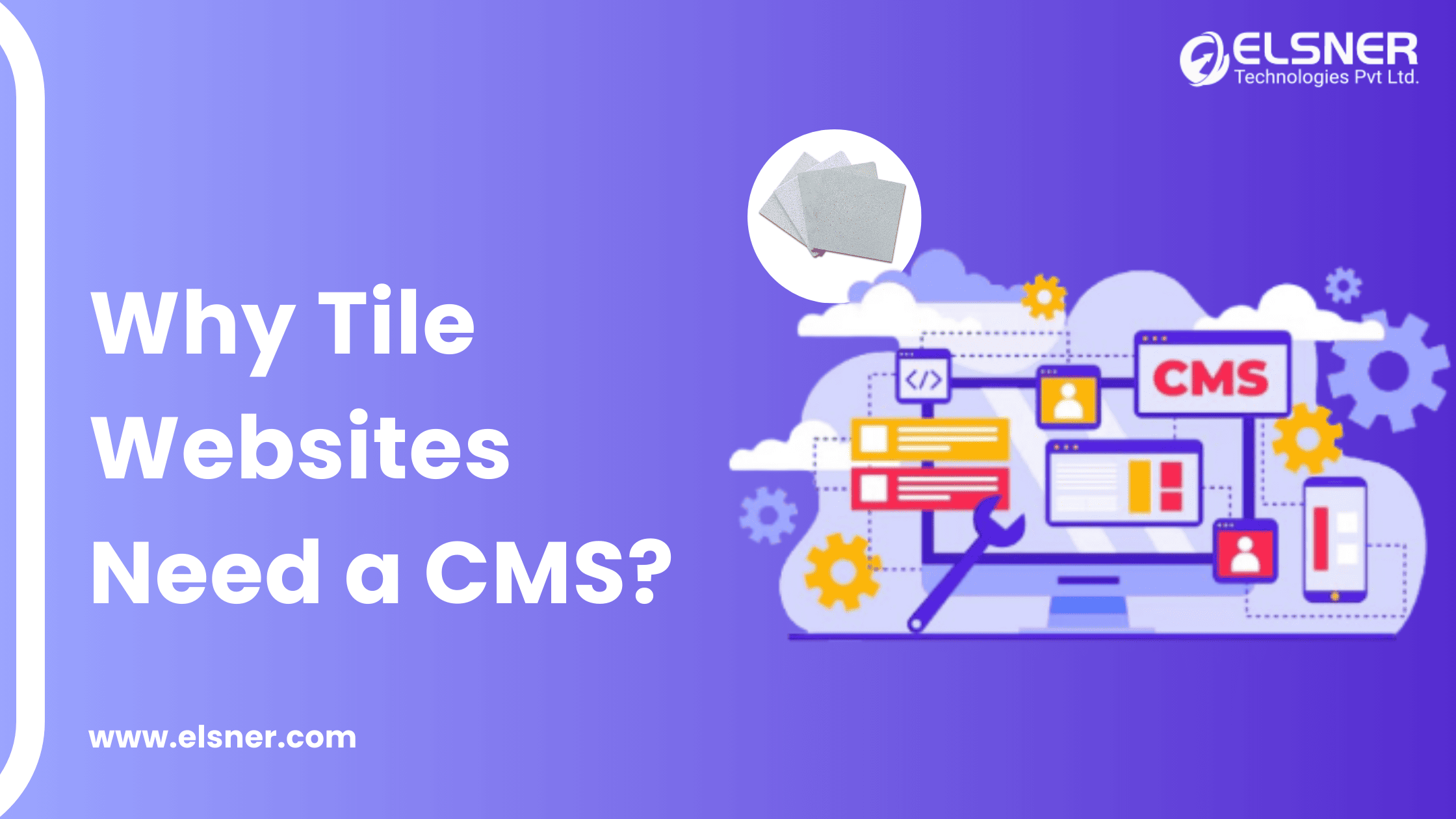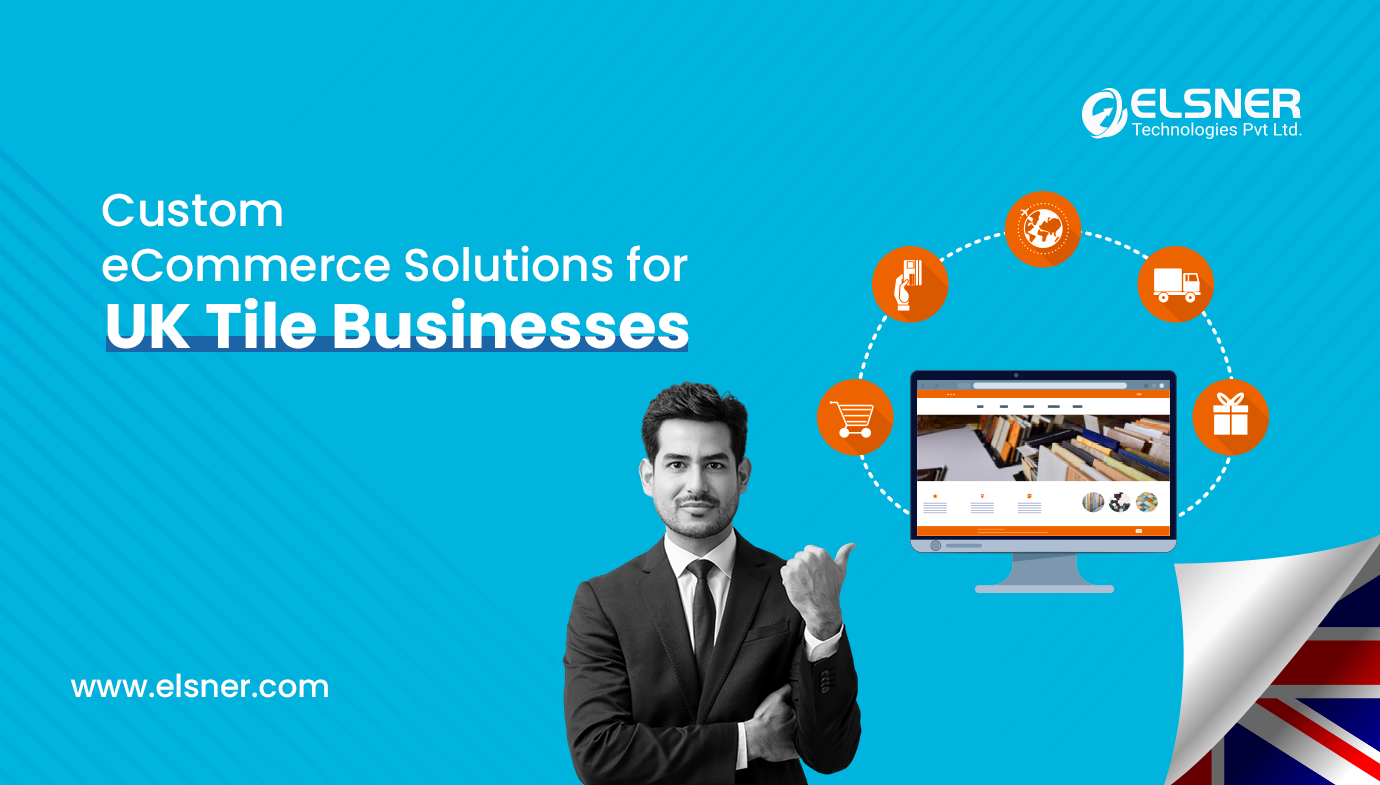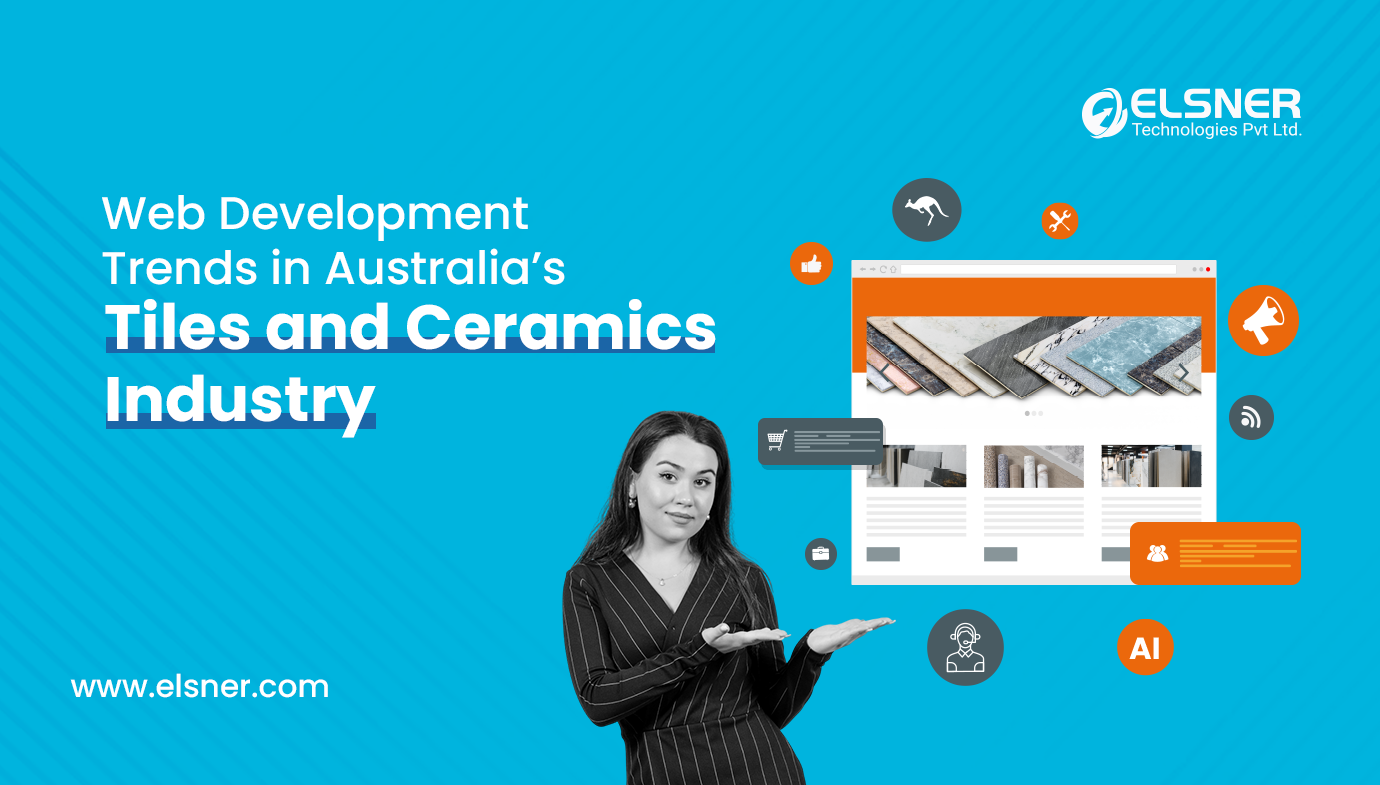- An Insight to the Innovative Features of Tiles Ecommerce Website
- Necessity of Innovative Features in the Tiles Industry
- Customer Experience:
- Improved Search Engine Optimization (SEO):
- Fewer Returns:
- Competitive Advantage:
- Virtual Room Designer
- Use of Virtual Room Designer
- Intuitive Interface
- Realistic Rendering
- Customization Features
- Advanced Features
- AR Layout Planning: A Revolutionary Feature for Tiles Ecommerce
- Benefits of AR Layout Planning:
- How AR Layout Planning Works:
- Tile Calculator: An Ideal Tile calculator for Tiles Ecommerce websites
- How a Tile Calculator Works:
- Benefits of Tile Estimator:
- Implementation Tips:
- Tile Planner: Tile Shopping Solution for Ecommerce Websites
- Must-Have Features for a Tile Planner:
- Benefits of a Tile Planner:
- Implementation Tips:
- Tile Visualizer
- How a Tile Visualizer Works:
- Key Features:
- Benefits of a Tile Visualizer:
- CREA 3D: Enhancing Tiles Ecommerce with 3D Technology
- 3D Product Visualization:
- Virtual Home Design Tools:
- AR and VR Experiences:
- 3D Printing for Prototyping:
- 360-Degree Showroom: A Virtual Reality Experience for Tiles Ecommerce
- Benefits of a 360-Degree Showroom:
- Implementation Tips:
- More Features:
- Example Use Cases
- HyperTouch: A New Wave in the Tiles Industry
- Key Features of HyperTouch
- Advantages of HyperTouch
- POS Systems: A Requirement for Tiles Ecommerce Websites
- Important Features of the POS System for Tiles Ecommerce are:
- Benefits of Using a POS System in Tiles Ecommerce:
- Selecting the Right POS System:
- Advantages of Adding Innovative Features in Ecommerce
- Why Innovative Features Matter
- Risks and Compliance in Ecommerce
- 1. Quality and Authenticity of Products:
- 2. Intellectual Property Protection
- 3. Data Privacy and Security:
- 4. Payment Processing and Fraud:
- 5. International Shipping And With Customs
- 6. Compliance:
- 7. Supply Chain Risks:
- Conclusion
Are you tired of those old, generic tiles in Ecommerce sites? That is a thing of the past. It’s time to take your online shopping game to the next level with creative features that will make choosing the perfect tiles for your home a snap.
In this blog post, we’ll walk you through the most interesting and useful features you must look for in a leading Ecommerce tiles website. Right from a virtual home design tool to personalized recommendations for products, these make sure your shopping journey is painless and fun.
Let’s start and discover what makes the best Ecommerce tiles websites different!
An Insight to the Innovative Features of Tiles Ecommerce Website
In a competitive market today, tile Ecommerce websites need to be more than basic to attract and retain customers. Innovative features can Enhance the user experience by a considerable amount, create increased sales by taking successive steps, and boost an efficient online presence.
Necessity of Innovative Features in the Tiles Industry
Customer Experience:
- More pertinent and engaging with each shopping experience can be achieved by using tailored recommendations based on a customer’s preferences and browsing history.
- Customers can preview how a given tile would look in their homes using Virtual Home Design Tools, thus not coming home with the wrong product.
Improved Search Engine Optimization (SEO):
- Richer snippets used for products increase visibility on search engines as well as provide more relevant details to the customers
- Structured data markup enables search engines to better understand the content; rankings tend to increase
Fewer Returns:
- Virtual try-on of tiles would stop unnecessary returns as the customer would be able to see how he/she wants tiles in his/her home before buying them.
- Product details help the customers decide whether to buy a product or not. Information such as the length and breadth of the product would prevent the person from buying products that do not meet his or her expectations.
Competitive Advantage:
- Novelty features can make your Ecommerce tiles website come out as head stronger than competitors, attracting a customer base.
- Innovation in your brand would sell as more and more people are attracted to it.
Virtual Room Designer
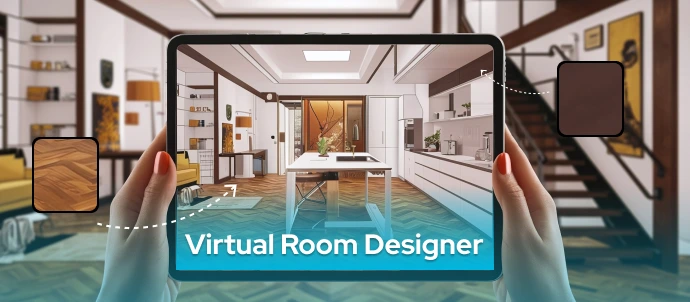
A virtual room designer is the ultimate tool that can change the face of your tiles Ecommerce website. It helps the customer to view how different tiles would look at their place, thereby providing an improved shopping experience, increased sales, and reduced returns. Here are a few elements to be considered while incorporating a virtual room designer into your website:
Use of Virtual Room Designer
Intuitive Interface
- Should be user-friendly and easy to adopt even for people who are non-tech-friendly
- Have direct, clear-cut instructions and guidelines that will help customers make the best of the tool.
Realistic Rendering
- Imagine high-quality graphics and materials that make for a realistic rendering of the room
- Computer simulation of natural and artificial conditions of lighting to exactly depict how the tiles will look in actuality.
Customization Features
- Should offer a field for customers to input their room’s dimensions so that every customer can have a customized experience.
- Allow customers to add furniture and other contents into the virtual room.
- Diverse tile materials, colors, and patterns for the customer
Advanced Features
- Save Designs: Auto-save designs to refer to or share with others
- Real-World Overlay: Virtual tiles can be overlaid in the real world using augmented reality.
- Interactive Experience: Enable customers to interact with virtual tiles, for example, zoom-in or rotate
- Direct Purchase: Enable users to buy tiles directly from the virtual room designer
AR Layout Planning: A Revolutionary Feature for Tiles Ecommerce
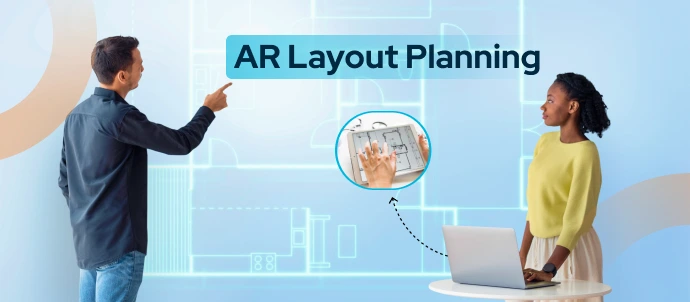
Augmented Reality (AR) will one day change the way customers make purchases of tiles. For example, with AR, tiles can be visualized in a customer’s home even before they have purchased them, thereby significantly reducing returns and improving the customers’ experience.
Benefits of AR Layout Planning:
- Customer Experience: The experience through AR is more immersive and engaging than other shopping experiences.
- Lower Returns: Customers can preview how tiles will look in their homes before they buy them. Their returns can thus be avoided.
- More Conversions: Through AR, customers can be more confident in their purchasing decisions, which results in high conversion rates.
- Competitive Advantage: Using an AR implementation sets up the Tiles Ecommerce website far above others.
How AR Layout Planning Works:
- Product scanning: Customers can scan a QR code or marker on the product page.
- Room View: The AR app overlaid a 3D model of the tile over the customer’s real-world space.
- Customization: Customers could try different tile layouts, colors, and patterns to get the right fit in the room.
Tile Calculator: An Ideal Tile calculator for Tiles Ecommerce websites
A tile calculator is an excellent resource to be used in planning a project, especially if used by a customer to compute how many tiles they will need for their activity. This function makes shopping easier and reduces the risk of buying more than enough or not enough.
How a Tile Calculator Works:
- Input Room Dimensions: The customer inputs the length, width, and height of the room.
- Choose Tile Size: The customer chooses what type of tile to use.
- Compute Number of Tiles: The estimator returns an approximate number of tiles with waste, grout, etc.
- Additional Features: Based on the estimator, there are other features such as the ability to compute the amount of grout and adhesive or preliminary estimates of cost.
Benefits of Tile Estimator:
- Saves Time and Effort: Customers can easily and timelessly compute the number of tiles they need without having to bother with the headache of doing the math.
- Reduces Waste: A tile calculator allows a customer to see credible estimates so that he does not overbuy, thereby reducing waste.
- Benefits Customer Experience: A tile calculator is convenient and instrumental in helping improve the shopping experience.
- Increase Conversion Rate: A tile calculator will increase the conversion rate as the process of buying has been streamlined.
Implementation Tips:
- Design the calculator to be user-friendly, and intuitive even to customers who are not so savvy with technology.
- Estimating by general industry standards from the calculator.
- Costing/estimation, calculation of grout and adhesive, saving of designs
- Optimize the calculator such that the application can run fully mobile-compatible to hit a wider range of targets.
Tile Planner: Tile Shopping Solution for Ecommerce Websites
A tile planner is a great tool that can change the face of your tiles Ecommerce website. It helps customers see how any of the tiles will look in their homes through multiple stages, thereby increasing the shopping experience and conversion rates, with lower returns.
Must-Have Features for a Tile Planner:
- The design should be user-friendly and easy to use, even for a non-techno-savvy customer.
- Graphics quality and lighting should be great to produce an excellent display of the room.
- You shall let the customers input their room dimensions, add furniture, and even options for a variety of tile materials, colors, and patterns.
- Optimize for mobile so that you can reach people in greater numbers.
Benefits of a Tile Planner:
- A Tile Planner provides for an enhanced rich, more engaging shopping experience.
- By enabling customers to see how tiles will look in their homes, it enhances conversions in a tile planner.
- Customers can make better decisions, so there is a lower chance of returns.
- Developing an effective tile planner for your Ecommerce website might make it stand out amongst the competition
Implementation Tips:
- Select a quality experience that is easy to integrate into your website.
- Take every precaution that the product loads fast and silky smooth on all devices
- Make use of the tool in easy-to-understand instructions and even present some helpful tips to them.
- Some of the other features to be incorporated are cost estimation, grout and adhesive calculation, and saving designs, among others.
Tile Visualizer
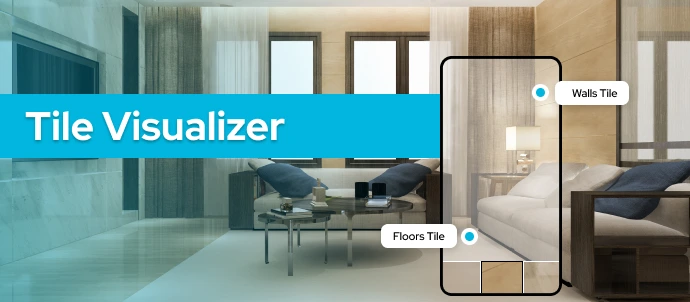
A tile visualizer is an online software that helps customers see what different tiles will look like in their homes even before they buy them. Over the past few years, this technology has really become very popular. It provides a much more immersive, custom-fit shopping experience.
How a Tile Visualizer Works:
- Product Selection: The customer picks the tiles he or she likes.
- Room Personalization: Clients can be enabled to input measurements of the room and choose the type they would love to choose.
- Visualization: The tile visualizer will depict the tiles in the designed room. A customer will get a live preview of what they will look like.
Key Features:
- Photorealistic Materials and Lighting: Capabilities that enable the simulation and match the appearance of the tiles in different lighting conditions and textures.
- AR and VR capability: Engages the customers in a virtual scenario or overlies tiles onto their space.
- Suggested tiles based on AI: Tiles based on user preference and design intent.
Benefits of a Tile Visualizer:
- A Tile Visualizer is one step further towards an engaging and interactive shopping experience.
- Customers can visualize how the tiles would look in their home scenario even before the purchase; thus, customers are safeguarded against rejections at delivery.
- You may see improved conversion rates by providing a more fun shopping experience.
- Tile visualizer may help you stand out from a variety of competitors.
CREA 3D: Enhancing Tiles Ecommerce with 3D Technology
CREA 3D, the largest 3D technology provider, can elevate tiles Ecommerce websites to a whole new level in terms of the experience. Here’s why:
3D Product Visualization:
- The software from CREA 3D will make your tiles look lifelike. It will help customers to see how tiles would look at different locations, lighting, or angles.
- Customers can rotate and zoom 3D models in several angles to observe the tiles.
Virtual Home Design Tools:
- The CREA 3D software can be used on websites selling tiles to create amazing virtual home designing tools.
- Users accessing such websites can customize their virtual rooms by choosing other tile options, layouts, and furniture.
AR and VR Experiences:
- The applied technologies of CREA 3D will allow the creation of AR and VR experiences, allowing customers to virtually place tiles within their homes.
- This immersive approach can thus enhance the engagement of customers and consequently reduce the probability of returns.
3D Printing for Prototyping:
- The 3D-printing technology from CREA 3D will allow tile makers to have prototypes of new designs in such a short period.
- This way, they can play with different forms, textures, and patterns without having invested the mass production and without being able to shake out mistakes or errors.
360-Degree Showroom: A Virtual Reality Experience for Tiles Ecommerce
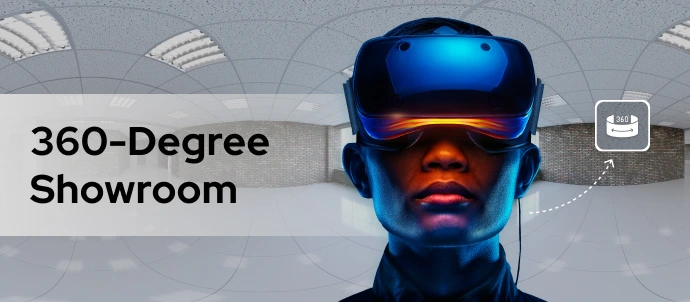
A 360-degree showroom is a virtual reality feature wherein customers can view all aspects of a showroom from every angle. A 360-degree showroom may make the experience of shopping tiles on an Ecommerce website much more engaging for customers.
Benefits of a 360-Degree Showroom:
- A 360-degree showroom lets customers envision sitting and being in a showroom, giving one a sense of being in the physical space. This also helps capture customers’ attention and will hold them longer on the website.
- The customers would be able to have a more realistic view of the size and look of the tiles in a real-world setting. This reduces return rates.
- A 360-degree showroom is sure to make your tiles Ecommerce website stand out from others.
Implementation Tips:
- Use a high-quality 360-degree image or video, which can give the customers a fair idea of what they would be selecting in reality.
- Create the showroom in an intuitive format and easy-to-use control mode.
- Use responsive design so that a showroom is also well-suited for mobile use.
- Hyperlink the 360-degree showroom to other product pages to make the ‘try before you buy’ option smooth and seamless.
More Features:
- Product Placement: Let the customer place his/her tiles in the showroom virtually in their own home.
- Customization: Allow them to customize by changing the lighting effects or add some furniture to the showroom
- Social Share: Let the customer share his virtual showroom on social networking sites.
Example Use Cases
- Showcasing Tile Collections: It has different tile collections with different locations like the kitchen, bathroom, or living room.
- Providing Virtual Tours: Enables people who cannot come in person to have a virtual tour of the showroom.
HyperTouch: A New Wave in the Tiles Industry
This revolutionary capacitive touch technology that HyperTouch allows individuals to access changes how a house should be interacted with. With seamless integration into home automation systems, HyperTouch is the sleek and intuitive means for controlling a multitude of devices and features.
Key Features of HyperTouch
- Activates Home Automation Sensors Through Light Touch: A capacitive touch technology acts to activate home automation sensors through a light touch.
- Concealed Technology: Free from cover plates and outer switches
- Ability to control the lighting, audio-video equipment, doors, and windows, as well as the temperature in your room
- Eco-active materials through which the antimicrobial agents, pollution, and odor particles can be defeated
Advantages of HyperTouch
- Increased Convenience: HyperTouch enables you with a useful and easy way to control the functions in your home.
- Sleek Design: Because of the discretion of the technology, it grants a minimalist and sleek outlook.
- Energy Efficiency: Optimized energy consumption can help turn your house toward sustainability.
- Eco-active materials make sure the environment remains clean and healthy for stay.
- Invisible, Safe, And Quick To Install.
- Hypertouch surfaces never stop innovating
POS Systems: A Requirement for Tiles Ecommerce Websites
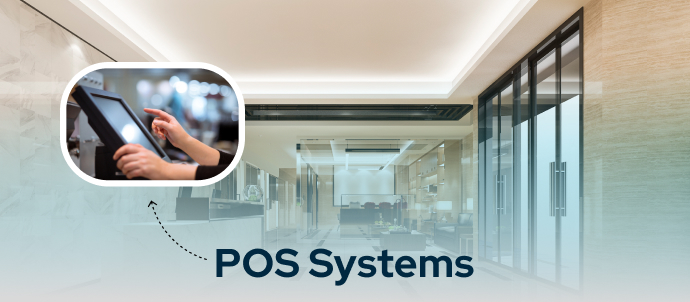
Point of Sale or POS system – one of the absolute necessities for a retail business, which includes tile Ecommerce websites. The POS system simplifies all kinds of sales transactions, manages the inventory, and offers vital insights into business performance.
Important Features of the POS System for Tiles Ecommerce are:
- Inventory Management: tracking of stock and product variations and low-stock alerts end.
- Sales Processing: Cash, card, and digital payments can be efficiently received as sales transactions.
- Customer Management: Customer information can be stored; it will help track the customer’s purchase history and provide a chance to offer loyalty programs.
- Reporting and Analytics: It will be possible to generate reports regarding sales performance, an inventory level report, and a customer behavior report.
- Integration with the Ecommerce Platform: Integrate with your e-store for which the stock should be updated and correct orders need to be delivered.
Benefits of Using a POS System in Tiles Ecommerce:
- Effectiveness in Sales Process: Reduces the error percentage generated by the human brain in the sales process.
- Experiential Check-out: Allows your customers to have more efficient and accurate experiences.
- Better Management of Stock: No chance of stockouts or overstocking.
- Accurate Information: Derive insights regarding the sales pattern, customer preferences, and product performance.
- Higher Profitability: Efficient working and less expense.
Selecting the Right POS System:
When you decide on a POS system for your tiles Ecommerce website, ensure that you keep in mind the following:
- Features Ensure that the system contains all the features you need such as inventory management, customer management, reporting, etc.
- Scalability: Choose that system that continues growing with your business when it extends.
- Integration capabilities Ensure that the system can integrate well with your Ecommerce platform and other business tools.
- Cost: Let them indicate to you the one-time cost of the system as well as the cost of periodic maintenance and support. Scan to find products.
Advantages of Adding Innovative Features in Ecommerce
With competition in today’s competitive world, it takes more than an immense product list to have an existence in the sea of Ecommerce. Innovative features greatly enhance the attractiveness of your website and encourage customers to interact actively on your website thereby increasing sales.
Why Innovative Features Matter
- Improved Customer Experience: A virtual home design tool, personalized AI recommendations, and augmented reality may provide a more engaging and personal experience and happen on the shopper’s end.
- More Conversions: Innovative functionality can help make a shopper more attentive to your website and engaged in the process with a pleasant shopping experience; thus, conversion rates will be higher.
- SEO: Improving a website through features such as a rich snippet and structured data adds to its rank in search engines.
- Low Return Rate: Facilitate customers’ ability to envision products in their homes before purchasing, thereby minimizing the return rate and maximizing customer satisfaction.
- Competitive Edge: Enable you to better differentiate your competition by offering unique and innovative features that your customers will love.
Risks and Compliance in Ecommerce
Ecommerce of tiles is one of the fast-growing online retailing platforms with associated risks and compliance issues. The risk and compliance considerations are as follows:
1. Quality and Authenticity of Products:
- Counterfeit Goods: Online platforms are more prone to counterfeit versions of tiles.
- Quality Control: It is also needed to ensure the authenticity along with the quality of goods so that there is no damage to the trust of the customer.
- Industry Standards Compliance: Keep abreast of industry standards as well as regulations regarding tile materials, dimensions, and performance standards.
2. Intellectual Property Protection
- Trademark and Copyright Infringement: Measure the extent to which your brand’s intellectual property has been infringed.
- Image and Design Piracy: Ensure that there is no piracy of images of the product or designs
- Compliance: Copyright and Trademark: Known copyright and trademark rights and respect those
3. Data Privacy and Security:
- Protection of customer’s data wherein customer’s sensitive details like credit card information are covered
- Safety from Data Breach: Measures are taken so that no data breaches take place.
- Compliance: Compiles with the international regulations as per GDPR and CCPA
4. Payment Processing and Fraud:
- Chargebacks: A chargeback is a situation in which the customer disputes the transaction with his or her bank.
- PCI DSS Compliance is actually the name, and it’s a set of security requirements that protect cardholder data.
5. International Shipping And With Customs
- Import / Export Regulation With Compliances of International Trade Regulation.
- Duties and Taxes Declaration and adequate payment of the customs duty and taxes.
- Cross-Border Shipping: Logistics managed as well as cross-border shipping issues that may arise.
6. Compliance:
- Consumer Protection Laws: Adherence to consumer protection laws in jurisdictions where you operate.
- Advertisement Standards: Adherence to advertisement standards and other regulatory requirements.
- Product Safety: You must have guarantees that your products comply with the stipulated safety standards.
7. Supply Chain Risks:
- Ethical Sourcing: The sold tiles should be sourced ethically and responsibly.
- Labor Practices: Your suppliers should adhere to some labor practices.
- Conflict Minerals: Avoid using conflict minerals in your products.
Address such risks and ensure compliance with relevant regulations so that businesses will be able to develop a successful and sustainable Ecommerce venture for tiles.
Conclusion
The best tiles industry Ecommerce website will be one that has innovative features, easy usage design, and an effective marketing approach. With factors such as virtual showrooms, AR try-ons, personal recommendations, and educational tools and materials, businesses can develop a compelling and involving online shopping experience.

About Author
Harshal Shah - Founder & CEO of Elsner Technologies
Harshal is an accomplished leader with a vision for shaping the future of technology. His passion for innovation and commitment to delivering cutting-edge solutions has driven him to spearhead successful ventures. With a strong focus on growth and customer-centric strategies, Harshal continues to inspire and lead teams to achieve remarkable results.

